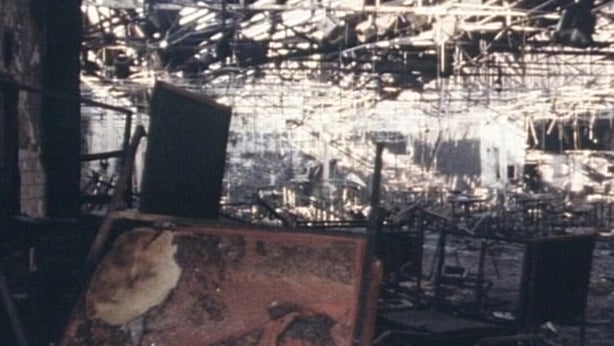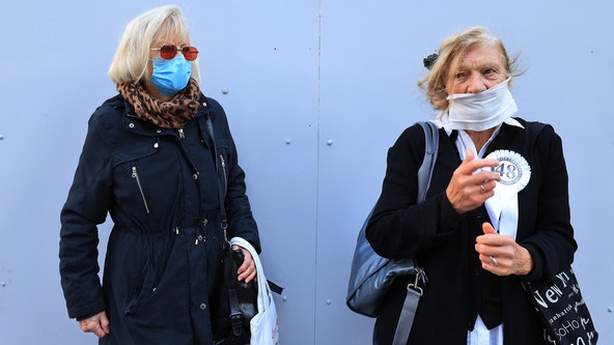A preliminary hearing of the Stardust fire inquests in Dublin has been told this will be a new inquiry, and the proceedings will not be a review or an adjudication on any probe that has gone before.
In the first of what is likely to be a number of preliminary hearings, Coroner Dr Myra Cullinane examined a number of procedural issues to facilitate the smooth running of the inquests, which are expected to begin next year.
Described as one of the largest losses of life arising out of one incident in the history of the State, the Coroner said the inquests are expected to be lengthy but will be new and not bound by any previous inquest finding.
Earlier, families had gathered outside Dublin Coroner's Court to mark the start of the process and remember those they lost almost 40 years ago.
Forty-eight people died and more than 200 were injured when the blaze broke out in the Stardust nightclub in Artane on St Valentine's night in 1981.
Full inquests into the deaths of the 48 people who died are due to get under way next year following a decision in 2019 by the Attorney General that new inquests were in the public interest and in the interest of justice.
Antoinette Keegan was in the ballroom when the fire broke out. She escaped, but her two sisters, Mary and Martina, died in the blaze.
Her mother Christine Keegan, who died three months ago today, had campaigned for decades for a new inquiry into the fire. Antoinette Keegan said she was thinking of her mother on what was an emotional day for all of those involved in the campaign.
Ms Keegan said she was confident that the new inquests will give answers to the families affected and will see justice for their loved ones. She said she believed that for the first time the victims will be portrayed as human beings, rather than numbers or statistics.

Gertrude Barrett, whose son Michael died in the blaze, returned to the Coroners Court this afternoon almost 40 years after she came there for the first time.
Ms Barrett said she did not like the word closure but did hope that this process would bring justice. She said she felt she had served a life sentence of loss, as had every other family who suffered as a result of what happened that night.
Solicitor Darragh Mackin of Phoenix Law, who is representing 44 families at the inquests, welcomed the inclusion of so-called pen portraits of all 48 victims of the fire. These are prepared statements which will be read out by family members at the start of next years inquests allowing them to describe the person they lost, and the impact their loss has had.
Mr Mackin said it gives the families an opportunity to tell of the brothers, sisters, mothers and fathers who died that night and a chance to put the victims at the very centre of the process.
Another preliminary hearing is expected to take place next month.

The Government announced in yesterday's Budget that an allocation of €8m would be made available for the new hearings.
The decision to open new inquests into the tragedy was taken in September 2019 by then Attorney General Seamus Woulfe, on foot of a long campaign by those affected by the tragedy.
At the time he said he believed, on balance of evidence, the holding of fresh inquests was in the public interest, and in the interests of justice.
His statement also said he considered that in the original inquests, there was an insufficiency of inquiry as to how the deaths occurred, specifically a failure to sufficiently consider circumstances surrounding the cause or causes of the fire.
A number of inquiries into the tragedy, including a Tribunal of Inquiry, have taken place but families of those killed and injured have been dissatisfied with previous findings.
The original Tribunal of Inquiry found that the cause of the fire was probable arson, a finding which angered the relatives of those who had died as they said it had damaged the reputations of their loved ones.
That finding was subsequently overturned by another inquiry in 2009.
In granting the fresh inquests, the Attorney General referenced the inquests into the Hillsborough Disaster in the UK in which inquests were granted 25 years after the football stadium tragedy in which 96 people died.
Mr Woulfe said that "drawing on analogies from the Hillsborough case … there is the entitlement of the families of the victims to the public revelation of the facts … to maximise the chances that the truth should emerge".
The Coroner is appealing to anyone who had any involvement in or was a witness to the fire in 1981, and who has not previously come forward to give a statement, to do so now.
The inquest team can be contacted via the Stardust inquest website, or by emailing info@stardustfireinquests.ie.




